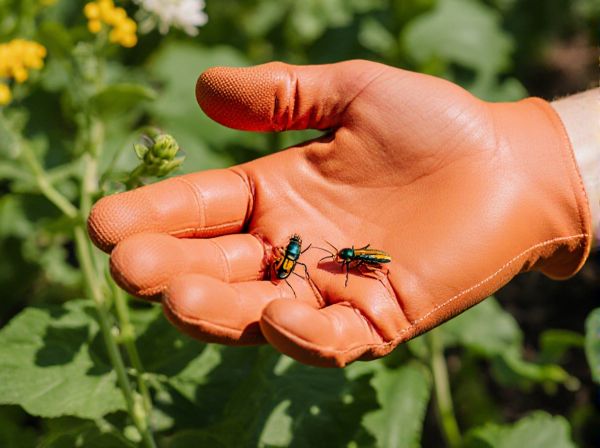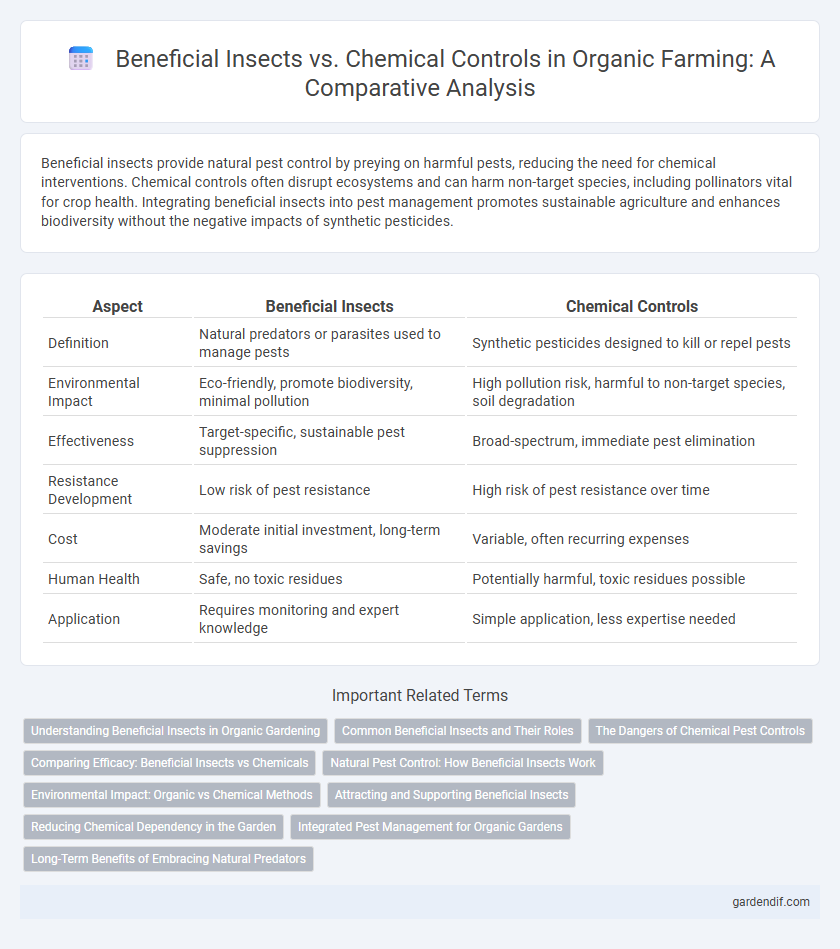
Beneficial insects vs chemical controls Illustration
Beneficial insects provide natural pest control by preying on harmful pests, reducing the need for chemical interventions. Chemical controls often disrupt ecosystems and can harm non-target species, including pollinators vital for crop health. Integrating beneficial insects into pest management promotes sustainable agriculture and enhances biodiversity without the negative impacts of synthetic pesticides.
Table of Comparison
| Aspect | Beneficial Insects | Chemical Controls |
|---|---|---|
| Definition | Natural predators or parasites used to manage pests | Synthetic pesticides designed to kill or repel pests |
| Environmental Impact | Eco-friendly, promote biodiversity, minimal pollution | High pollution risk, harmful to non-target species, soil degradation |
| Effectiveness | Target-specific, sustainable pest suppression | Broad-spectrum, immediate pest elimination |
| Resistance Development | Low risk of pest resistance | High risk of pest resistance over time |
| Cost | Moderate initial investment, long-term savings | Variable, often recurring expenses |
| Human Health | Safe, no toxic residues | Potentially harmful, toxic residues possible |
| Application | Requires monitoring and expert knowledge | Simple application, less expertise needed |
Understanding Beneficial Insects in Organic Gardening
Beneficial insects play a crucial role in organic gardening by naturally controlling pest populations, reducing the need for chemical interventions. Predators like ladybugs, lacewings, and parasitic wasps target harmful pests such as aphids, thrips, and caterpillars, maintaining ecological balance. Utilizing beneficial insects supports sustainable gardening practices, enhances soil health, and promotes biodiversity without chemical residues.
Common Beneficial Insects and Their Roles
Common beneficial insects such as ladybugs, lacewings, and predatory beetles play a crucial role in organic farming by naturally controlling pest populations like aphids and caterpillars. These insects reduce the need for chemical controls, promoting a healthier ecosystem and minimizing environmental impact. Encouraging habitats for beneficial insects supports sustainable pest management and enhances crop productivity.
The Dangers of Chemical Pest Controls
Chemical pest controls pose significant risks to the environment, including the contamination of soil and water sources with toxic residues. These substances can harm non-target beneficial insects such as pollinators and natural predators, disrupting ecological balance and reducing biodiversity. Exposure to chemical pesticides also presents health hazards for humans, including respiratory problems and potential long-term chronic effects.
Comparing Efficacy: Beneficial Insects vs Chemicals
Beneficial insects such as ladybugs and lacewings provide targeted pest control by naturally reducing aphid and mite populations without harming the ecosystem, making them effective in maintaining long-term soil and plant health. Chemical controls offer immediate pest eradication but often lead to resistance development and harm to non-target species, disrupting beneficial insect populations and reducing biodiversity. Studies reveal that while chemicals act faster, beneficial insects contribute to sustainable pest management with cumulative efficacy and minimal environmental impact.
Natural Pest Control: How Beneficial Insects Work
Beneficial insects such as ladybugs, lacewings, and parasitic wasps naturally reduce pest populations by preying on harmful insects like aphids, mites, and caterpillars, promoting a balanced ecosystem. Unlike chemical controls, these biological predators target specific pests without harming plants, pollinators, or soil health. Utilizing beneficial insects in organic gardens enhances sustainable pest management by minimizing pesticide use and supporting biodiversity.
Environmental Impact: Organic vs Chemical Methods
Beneficial insects in organic farming promote ecological balance by naturally controlling pests without harming non-target species or contaminating soil and water. Chemical controls often lead to environmental degradation, including pesticide resistance, pollinator decline, and groundwater pollution due to toxic residues. Organic methods reduce carbon footprint and support biodiversity, making them a sustainable alternative to chemical pesticides.
Attracting and Supporting Beneficial Insects
Attracting and supporting beneficial insects in organic gardening enhances natural pest control by promoting predators like ladybugs, lacewings, and parasitic wasps. Planting diverse flowering species such as marigolds, yarrow, and dill provides nectar and habitat, increasing beneficial insect populations and reducing reliance on chemical controls. Maintaining ground cover and avoiding pesticides also preserves ecosystems that sustain these insects' life cycles, fostering a balanced garden environment.
Reducing Chemical Dependency in the Garden
Beneficial insects such as ladybugs, lacewings, and predatory beetles play a crucial role in reducing chemical dependency by naturally controlling pest populations in organic gardens. Employing these natural predators enhances soil health and biodiversity while minimizing harmful chemical residues. This sustainable pest management approach supports long-term ecological balance and productivity in garden ecosystems.
Integrated Pest Management for Organic Gardens
Integrated Pest Management (IPM) in organic gardens emphasizes the use of beneficial insects such as ladybugs, lacewings, and predatory wasps to naturally control pest populations, reducing reliance on chemical controls that can harm the ecosystem. These beneficial insects target specific pests like aphids, whiteflies, and caterpillars, effectively maintaining plant health while preserving soil quality and beneficial microfauna. Utilizing IPM strategies, organic gardeners create balanced environments that promote biodiversity and reduce chemical residues in crops.
Long-Term Benefits of Embracing Natural Predators
Embracing beneficial insects as natural predators promotes sustainable pest management by reducing dependency on harmful chemical controls that can disrupt ecosystems. These insects maintain ecological balance, enhance soil health, and foster biodiversity, resulting in resilient crop systems over time. Continuous use of natural predators supports long-term agricultural productivity and decreases environmental toxicity associated with synthetic pesticides.
Beneficial insects vs chemical controls Infographic

 gardendif.com
gardendif.com